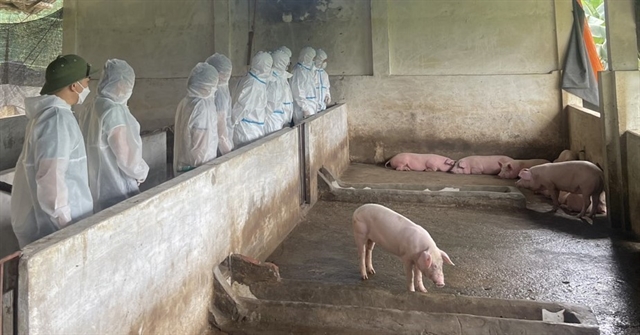New draft decree aims to boost animal disease control measures
Society – Economy - Ngày đăng : 08:56, 09/01/2025
 |
| Veterinary staff inspect African swine fever prevention and control efforts in Phủ Thông Town, Bạch Thông District, Bắc Kạn Province. — VNA./VNS Photo |
HÀ NỘI — Individuals outside the government payroll, mobilised for animal disease prevention and control efforts, will be entitled to financial support, according to a new draft decree submitted by the Ministry of Agriculture and Rural Development (MARD) to the Government.
They would receive VNĐ400,000 (US$15.7) per day, with the amount rising to VNĐ500,000 (US$19.7) on weekends, holidays and during Tết.
The draft decree outlines several measures to improve disease control and ensure effective implementation. It also specifies financial support for government payroll workers and compensation for losses due to outbreaks of disease.
Government payroll workers participating in disease prevention would also be entitled to allowances, ranging from VNĐ150,000 per day on regular workdays to VNĐ300,000 on weekends and public holidays.
For individuals impacted by outbreaks, financial support would be calculated based on the type of livestock and weight. Financial support rates would also be provided to aquaculture facilities, including shrimp farming operations, with businesses eligible for a portion of the assistance.
The Director of the Department of Animal Health under MARD, Nguyễn Văn Long, highlighted the draft’s focus on fairness.
He noted that support will now extend to production facilities and businesses forced to destroy animals or animal products due to disease outbreaks, as well as individuals directly participating in prevention efforts.
According to Long, disease prevention is a shared responsibility, affecting all types of farms, including those owned by businesses and the armed forces. Support must be distributed equitably under the law.
Nearly 50 delegations of National Assembly deputies have urged MARD to propose practical and feasible policies to address gaps in animal disease control.
Current support levels, established in 2008, fall significantly below unskilled labour wages, making it difficult to recruit adequate personnel for disease control. These policies also fail to account for emerging diseases such as African swine fever, lumpy skin disease, as well as long-standing threats like rabies.
Local authorities face challenges mobilising workers due to heavy workloads, health risks and inadequate incentives.
Moreover, cumbersome procedures and delayed compensation have caused frustration among farmers, leading to underreporting, illegal slaughtering and improper disposal of infected animals, exacerbating the spread of disease and environmental pollution.
Decree No. 02/2017/NĐ-CP, which governs agricultural recovery post-disaster or disease, has revealed systemic shortcomings. These include the exclusion of public institutions, armed forces and small-to-medium enterprises from eligibility. Compensation frameworks also vary by locality, leading to inequities.
The proposed decree aims to establish a unified legal framework, addressing these shortcomings by simplifying procedures, offering fair compensation, and encouraging cooperation in disease control.
By strengthening disease prevention measures, the draft decree seeks to reduce economic losses, ensure public health and food safety, and minimise environmental risks across the country. — VNS
